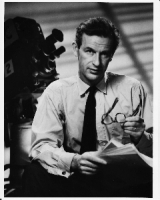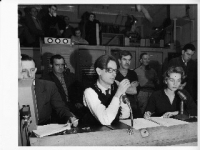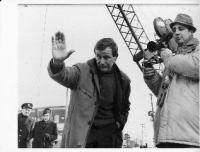


Year Born: 1915
Year Died: 2007
Pioneer
Weyman, Ron (1915-2007)
Ronald Charles Toshack Weyman was born in Erith, Kent, on Dec. 13, 1915. His family immigrated to Canada in 1923 and eventually settled in Toronto. A painter, sailor and actor, he became part of a local theatrical group that swirled around Dora Mavor Moore, the RADA trained actress who had founded The Village Players in 1938. After serving with distinction in the Royal Canadian Naval Volunteer Reserve in the Second World War, he intended to become a serious painter, but was deflected into film after a chance encounter in Ottawa with Sydney Newman, a director and producer with the National Film Board.
Ron worked for the NFB from 1946 to 1953. He made more than 20 films, including After Prison, What?, which won the prize for best theatrical film at the Canadian Film Festival in 1951, and The Safety Supervisor, which earned a first award at the Venice Film Festival in 1952. After seven years, he quit to freelance in Italy. While abroad, he wrote and filmed eight documentaries in Italy and the Middle East for the NFB and the United Nations. In 1954 he returned to Canada and joined the CBC, working under Robert Allen.
He worked on most of the dramatic series produced in Toronto including On Camera, The Unforeseen, Television Theatre, First Performance, General Motors Presents, Startime and Playdate. In 1956 he produced The Discoverers, a dramatization of the discovery of insulin in the laboratory of Dr. F.G. Banting and Charles Best. The film won a Christopher Award and was shown in the Canada Pavilion at the Brussels World Fair in 1958. As executive producer of The Serial (which ran for three seasons from Sept. 1963 through June 1966), Ron sent units out of the studios and into the streets to shoot stories about contemporary social issues in real locations and he pioneered the mini-series and the limited dramatic series on CBC-TV. He also commissioned and aired dramatizations of Thomas Raddall’s The Wings of the Night, Morley Callaghan’s More Joy in Heaven and Thomas B. Costain’s The Son Of A Hundred Kings. As well he made his own production of Convoy, Joseph Schull’s World War II story about a German submarine attack on a Canadian corvette.
By June, 1965, Ron was executive producer of one hour drama on CBC-TV, where Paul Almond and Daryl Duke were only two of the directors he hired. The third and final season of The Serial opened with David Gardner’s production of Mr. Member of Parliament. Written by George Robertson, it starred Gordon Pinsent as Quentin Durgens, a young and idealistic lawyer. Mr. Member of Parliament was so well received that the CBC developed it as a series, Quentin Durgens, M.P. It was shot on tape, but went on location for each episode and made actor Gordon Pinsent a star.
Tell Them The Streets Are Dancing, which aired as a one hour drama on The Bob Hope Theatre, on March 9, 1966 became the pilot for Wojeck. Based on the files of Toronto coroner Dr. Morton Shulman, the pilot was written by Philip Hersch and starred John Vernon, Bruno Gerussi and Patricia Collins. Graeme Woods was the director of photography. The project went to series, starring John Vernon as Wojeck, and attracted nearly three million viewers with an audience enjoyment of 80. The episode, The Last Man in the World, won the Wilderness Award as the CBC’s best film production of 1967 and an award at the Monte Carlo Film Festival. As a model, Wojeck (which ran from Sept. to Nov. 1966 and from Jan. to March 1968) was the forerunner of NBC’s Quincy, M.E., and CBC’s Da Vinci’s Inquest.
Using the same formula as Wojeck, but in a much less serious way, Ron was the executive producer on another drama series called McQueen: The Actioneer, about a crusading newspaper columnist. Based on journalist Frank Drea’s “Action Line” column in the now defunct Toronto Telegram, the series starred Ted Follows as McQueen. It lasted one season from Sept. 1969- Sept 1970.
Ron continued to make dramas at the CBC in the 1970s with shows such as Corwin, The Manipulators, Welcome Stranger, The Albertans and a dramatization of Margaret Laurence’s novel The Fire Dwellers, but nothing exceeded the audience rapport he had achieved a decade earlier with Wojeck.
After he retired from the CBC in 1980, Mr. Weyman turned back to painting and to writing screenplays and a new form: novels. He borrowed Sir Arthur Conan Doyle’s famous fictional character Sherlock Holmes and created new adventures for him in Sherlock Holmes & the Ultimate Disguise, Sherlock Holmes and the Case of the Mark of the Beast and Sherlock Holmes’ Travels in the Canadian West. Mr. Weyman also wrote In Love and War: A Memoir, a vivid account of his romantic and naval experiences in the war. As well, he directed the occasional film, learned to play classical guitar and travelled.
Ron Weyman died at his farmhouse near Flesherton, Ont., on June 26, 2007.
Written by Sandra Martin – October, 2007
